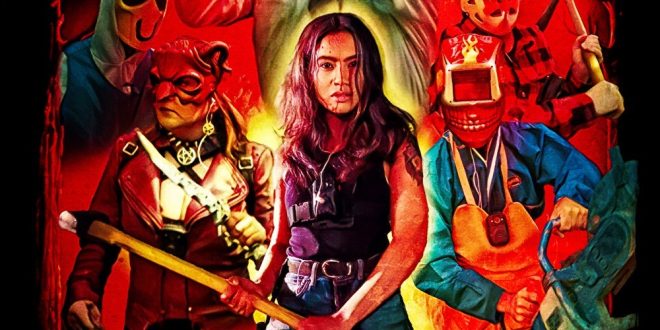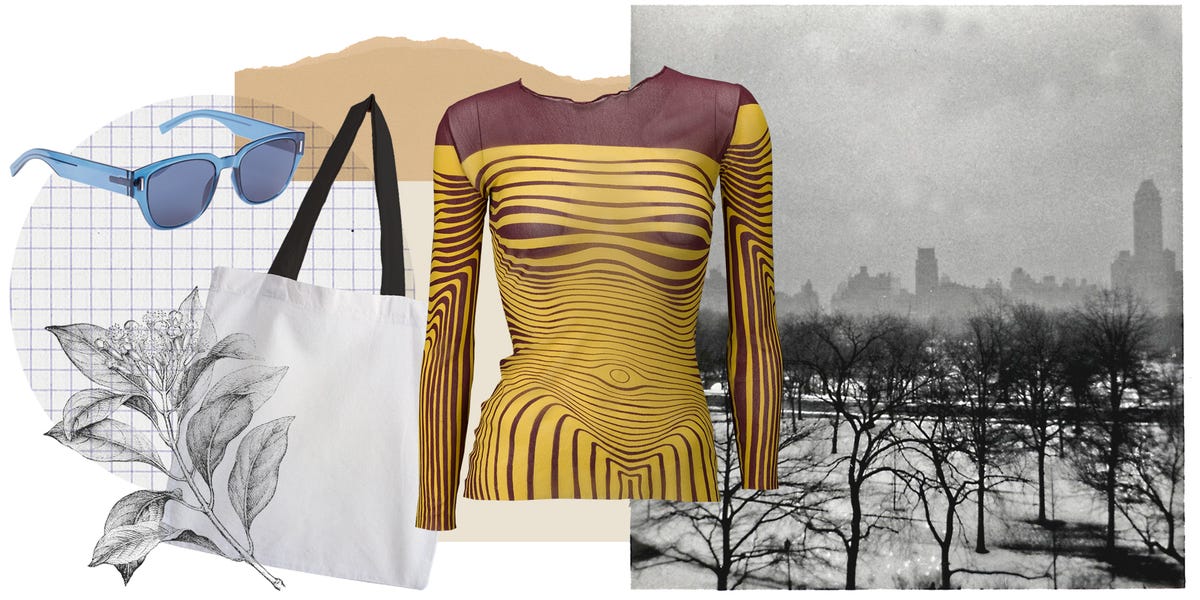Twice a month Joe Lipsett will dissect a new Amityville Horror film to explore how the “franchise” has evolved in increasingly ludicrous directions. This is “The Amityville IP.”
Last editorial, I pondered if the best films in the Amityville Horror franchise are the paired entries. As we cross off the seventh entry, that suspicion holds true. Amityville: A New Generation has decent ambition for a franchise creeping towards double digits; it simply needed a few tweaks in its execution. At the end of the day, the film feels aggressively early 90s direct-to-video horror, slightly better than something like a mid-range Candyman or Hellraiser.
The 1993 film is set in an apartment complex whose residents are an artist collective. The film uses the same formula as The Amityville Curse for its characters (a combination of lovers and friends), as well as It’s About Time and 3-D (a new haunted object). In this case, it’s a garish mirror, complete with gargoyle faces encrusted with red jewels. The mirror offers individuals a distorted glimpse of their death, which, in theory, is more malevolent than the other objects in the series, but, in reality, is less interesting because it simply telegraphs all of the set pieces.
A New Generation’s protagonist is twenty-something photographer Keyes Terry (Ross Partridge) whose girlfriend, Llanie (Lala Sloatman) is ready to take their relationship to the next level. Keyes is guarded, though, due to a family secret he has repressed: as a teenager, Keyes’ father, Franklin Bronner (Jack Orend) killed his entire family on Thanksgiving in the Amityville house before the DeFeo murders in the first film.
The Bronner murders and Franklin’s attempt to activate his son’s latent murderous impulses directly connects A New Generation to the first two films compared to the last few Amityville sequels, which deliberately strayed from the franchise mythology. Keyes’ backstory also provides some of the film’s most engaging set pieces, including a stand-out sequence when Keyes visits Danamore State Hospital and is beset by visions of the past.

Horrific visions are a fairly standard horror movie trope, but it is all about how director John Murlowski and cinematographer Wally Pfister -who would go on to shoot most of Christopher Nolan’s films (!) – shoot the flashbacks/hallucinations.
In a moment that is both trippy and disorienting, the audience mistakenly believes that Keyes has been falsely imprisoned at Danamore. Keyes is beaten by guards and wheeled into the visitation room where he is referred to by his father’s name. It is only when he sees himself as a child that it becomes clear that this is a repressed memory from his youth: as a young boy, Keyes watched his father beat his mother to death during a routine hospital visit.

Alas Keyes’ psychedelic visions are only one part of the film, which involves a series of rote murders by the mirror that are written off as suicides. They range from bland (NoES 2 and Vamp’s Robert Rusler’s Ray runs into a window and dies from minor cuts?) to predictable and silly (David Naughton’s Dick is lured into the basement and electrocuted) to predictable, but visually compelling (Julia Nickson-Soul’s Suki is stalked around her studio as canvases and nooses plummet around her).
One wishes that there were a few less characters so we could spend more time with them. The group isn’t particularly memorable, but the dialogue – courtesy of It’s About Time’s screenwriters Christopher DeFaria and Antonio M. Toro – has a wise-ass sensibility that helps to make them feel more fully realized. When Suki is trying to convince landlord Dick to let the group use the building for an art show, she jokingly chastises him with “Oh Dick, don’t be one.” Keyes jokes that he’s scared of “Rent. And Republicans” and there’s a sight gag when performance artist Pauli (Richard Roundtree) kicks an art critic out of his installation by revealing there’s a loaded gun involved. The seventh Amityville didn’t have to try so hard, but this playfulness helps to make the viewing experience fun.

Also, as enjoyable as the dialogue is, the narrative struggles to balance the denizens of the art collective and Keyes’ backstory, which wreaks havoc with the pacing. This is particularly true when it comes to the deaths, which feel deliberately timed to coincide with the commercial reels of the direct-to-video. As a result, the plot is constantly cutting back and forth between a standalone death scene and Keyes’ investigation of his past, which robs A New Generation of a great deal of tension – at least until everyone comes together for the art show climax.
Overall, Amityville: A New Generation is a step down from its predecessor, but Pfister’s cinematography livens up several set pieces and the characters are fun.

The Amityville IP Awards
- Celebrity Cameo: Both Terry O’Quinn and Lin Shaye appear in the film! O’Quinn is Detective Clark, a police officer, while Shaye plays Nurse Turner, a Danamore employee. The former is saddled with the stereotypical belligerent cop role, which doesn’t provide him much to do, but Shaye is delightful as a wise-cracking prankster.
- Most Direct-To-Video Moment: Tits! The soft core sex scenes began in It’s About Time and they continue here as Keyes and Llanie simply must go to pound town in order to check off A New Generation‘s requisite boob requirement.
- Best FX: The decision to bring back William Cuse to recreate the original film’s special effects is inspired, even if – accordingly to the interviews on the Vinegar Syndrome disc – it proved exceptionally time consuming and challenging to achieve the retro 70s effect.
Next Time: We’re headed to the Dollhouse for 1996’s eighth entry in the franchise.

The post ‘Amityville: A New Generation’ Offers Exceptional Cinematography and Amusing Dialogue [The Amityville IP] appeared first on Bloody Disgusting!.
































































![‘Amityville: A New Generation’ Offers Exceptional Cinematography and Amusing Dialogue [The Amityville IP] ‘Amityville: A New Generation’ Offers Exceptional Cinematography and Amusing Dialogue [The Amityville IP]](https://i0.wp.com/bloody-disgusting.com/wp-content/uploads/2023/01/new-gen.png?resize=1000,600&ssl=1)















